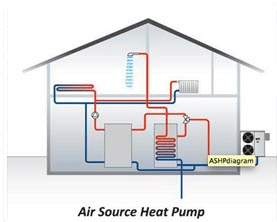Air Source Heat Pumps

Heat your home with the air around you using an ASHP
Air source heat pumps absorb heat from the outside air and transfer it into your home heating system. This heat can then be used to heat your home through radiators, underfloor heating systems, warm air convectors and hot water in your home much like any other heat source.
An air source heat pump extracts heat from the outside air in the same way that a fridge extracts heat from its inside,using the same compressor technology a heat pump can raise the temperature of the absorbed heat and then exchange it into your home. It can get heat from the air even when the temperature is as low as -15° C. Heat pumps do have a limited impact on the environment as they need electricity to run, but as the heat they extract is from constantly renewed natural sources such as the ground, air or even water and they typically produce more than twice the energy they consume, they are still a massive green source when it comes to heating.
The Benefits
 Air source heat pumps (also known as ASHPs):
Air source heat pumps (also known as ASHPs):
- could lower your fuel bills, especially if you are looking to replace older electric or oil fired heating
- could provide you with a regular payments through the government’s Renewable Heat Incentive (RHI)
- could lower your home’s carbon emissions, especially if a replacement for oil fired boilers.
- can provide both heating and hot water to your home
- low maintenance once installed – they’re called ‘fit and forget’ technology
- can be easier to install than a ground source heat pump, as it requires no groundwork
Unlike a gas or oil boiler, which typically heat water to a certain temperature and then stop and kick in again if the water drops below a certain ambient temperature, creating peaks and lulls in activity and energy usage, a heat pump provides a sustained lower output. Due to this it can be advisable to keep your heat pump on for longer than you would a gas boiler however it will be using less energy than a conventional system would.
Is an air source heat pump suitable for me?
To tell if an air source heat pump is the best choice for your home, there are a few key questions to consider:
- Do you have somewhere to put it? You’ll need a soace on the outside of your home where a unit can be fitted to a wall or placed on the ground. It will need a good space around it in order to get a good flow of air and work at maximum efficiency . A sunny wall is preferable.
- Is your home well insulated? This is a good thing to consider whenever making home improvements or looking to reduce energy bills. Since air source heat pumps work more effeciently when producing a constant heat at a lower temperature than a traditional gas or oil boiler, it’s essential that your home is insulated and draught-proofed well for the heating system to be effective and work to its best. This is also one of the simplest ways of reducing your energy bills and carbon footprint.
- What fuel will you be replacing? A heat pump based system will pay for itself much more quickly if it’s replacing an electricity or coal heating system.
- What type of heating system will you use? Air source heat pumps can perform better with underfloor heating systems or warm air heating than with radiator-based systems because of the lower water temperatures required.
- Is the system intended for a new development? Combining the installation with other building work can reduce the cost of installing the system.
You may also want to consider ground source heat pumps, which use pipes buried in the garden to extract heat from the ground.
Costs, savings and earnings
Costs
Installing a typical system costs around £6,000 to £10,000. Running costs will vary depending on a number of factors – including the size of your home, and how well insulated it is, and what room temperatures you are aiming to achieve.
Savings
How much you can save will depend on what system you use now, as well as what you are replacing it with. Your savings will be affected by:
- Your heat distribution system If you have the opportunity, underfloor heating can be more efficient than radiators because the water doesn’t need to be so hot. If underfloor heating isn’t possible, use the largest radiators you can. Your installer should be able to advise on this.
- Your fuel costs You will still have to pay fuel bills with a heat pump because it is powered by electricity, but you will save on the fuel you are replacing. If the fuel you are replacing is expensive you are more likely to make a saving. If you were using an oil fired system you can now be free of reliance on deliveries that can be cancelled or delayed leaving you potentially without heat.
- Your old heating system If your old heating system was inefficient, you are more likely to see lower running costs with a new heat pump.
- Water heating If the heat pump is providing hot water then this could limit the output of your heating. You might want to consider Solar water heating to provide hot water in the summer and help keep your heat pump efficiency up.
- Using the controls Learn how to control the system so you can get the most out of it. You will probably need to set the heating to come on for longer hours or keep it set constant in the winter, but you might be able to set the thermostat lower and still feel comfortable. Your installer should explain to you how to control the system so you can use it most effectively.
Earnings
You will be able to receive payments for the heat you generate using a heat pump through the government’s Renewable Heat Incentive (RHI).
Maintenance
Heat pump systems typically come with a 10 year warranty. You can expect them to operate for 20 years or more, however like most household equipment, regular checks and maintenance are important to keep your heat pump running at maximum efficiency . A regular check by you at least yearly and a more detailed check by a professional installer every 3-5 years should be sufficient.
One of your checks that you are advised to carry out is to check that the air inlet grill and evaporator are free of leaves or other debris. Any plants that have started to grow near the heat pump unit will also need to be removed. You may also be advised by your installer to check the central heating pressure gauge in your house from time to time. If so, you should be shown how to do this. keeping an eye on these thing will keep you pump running smoothly and flag up small issues before they affect the running of your heat pump.
If your heat pump has external refrigeration pipes (very unusual for a domestic system) these will need to be serviced annually by a refrigeration engineer.
Planning permission
Air source heat pump installations In Wales and Northern Ireland require planning permission. In England and Scotland they may be considered Permitted Development, in which case you will not need planning permission, but the criteria can be complex so it is always a good idea to check with your local planning office.




